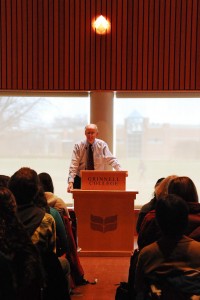By Max Mindock
mindockm@grinnell.edu
Colman McCarthy visited Grinnell to give a lecture focused on peace education at all levels from elementary school to college degree programs yesterday. McCarthy is a world-renowned peace activist, author, teacher, anarchist and journalist. He wrote for the Washington Post for nearly 30 years and now directs the Center for Teaching Peace in Washington, D.C.

McCarthy came to Grinnell through the planning of Morgan Bober ’12 and Erica Seltzer-Schultz ’12, with collaborative efforts from the Rosenfield Program, the Center for the Humanities, the Peace Studies Program, AJust Grinnell, and the Religious Studies Department.
He started the lecture with a moment of silence—a time for everyone to reflect upon the acts of violence that man has committed. Following the silence, he asked the audience, “Can you teach peace like any other academic subject?”
McCarthy believes that peace should be taught in schools the same way algebra or biology is taught. He believes the teachings of peace are something all students should experience to have a well-rounded education.
Not only can peace be taught, McCarthy believes, but aggression too. He believes American culture tends to promote competition and acts of aggression rather than peace and negotiation.
“We know about the men and women who protect the peace, but not about the men and women who make the peace,” McCarthy said.
He also considers capitalism and capitalistic teachings to be negative impacts on a young child. He is disturbed by games such as Musical Chairs and Spelling Bees because they encourage competition between individuals and their peers and distinguish one winner with everyone else being losers.
“That’s capitalism: Get all you can and knock the others down,” McCarthy said.
Instead of promoting competition, McCarthy advocates for education to be enjoyable and free of fear. He believes there are two types of learning: fear-based learning and desire-based learning. Most teachers, including the majority of professors at Grinnell, teach with a fear-based style opposed to a desire-based teaching style.
“There are two types of professors at Grinnell,” McCarthy said. “Those who want power over you and those who want power with you.”
McCarthy hopes all professors become professors who want power with you and encourages students to take a stance against the professors who want power over you. He encourages Grinnell students to peacefully come together and protest to show their dislike of homework and exams. This is not simply because Grinnell students do not want to do work; this is because Grinnell students want to learn by desire, not fear.
“When you go to power by yourself you agonize, when you go to power with a group, you organize,” McCarthy said.
He also compared Grinnell students to being customers and Grinnell College to be the suppliers. He advocates the customers to demand a new type of product; he advocates for students to demand a better-funded Peace Studies Program and even have a Peace Studies major.
He stated that Grinnell’s goal as a college should be being able to say, “Come to Grinnell: We’re going to teach you how to be peacemakers” and that a Peace Study major “would turn Grinnell from a good school into a great school.”
McCarthy believes that with peace, “We may not always see eye to eye, but we can always talk heart to heart.”


















































